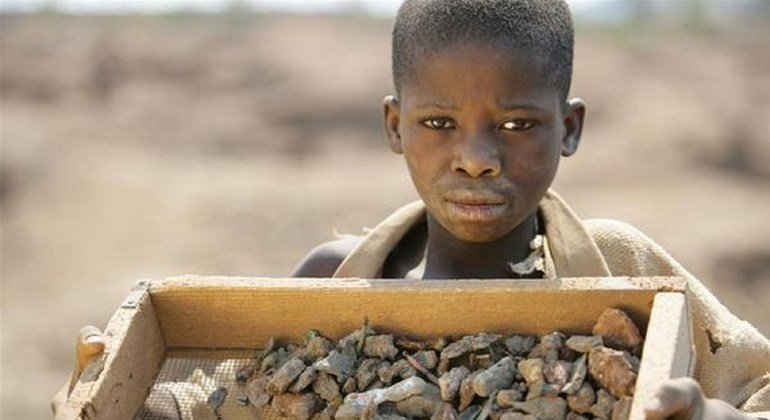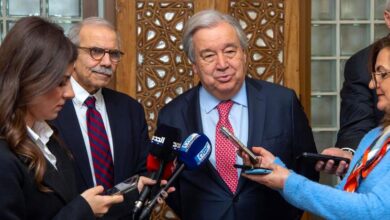INTERVIEW: Developing countries risk missing out on net zero benefits, but a more equitable future is possible

Main author of Mid-year update report on World Economic Situation and ProspectsDESA’s flagship report released on May 16, outlined its key findings in an interview with UN News.
This interview has been edited and condensed for clarity and length.

Hamid Rashid: Inflation has fallen significantly from its 2022 peak, but not to the point where central banks can say they have won the war. There’s still room for improvement.
At the launch of the report, we mentioned that the US Federal Reserve targets “personal consumption expenditure inflation”, not in terms of what you buy but what you consume and that includes rent, including “estimated rent” [what homeowners would pay if they were still renting and how much it would have gone up].
Those numbers move pretty slowly, and that really makes it difficult for the numbers to come down quickly.
Some developing countries still have very high inflation but overall the trend is very positive.
UN News: And the reason we care about this is because there’s often a gap between the cost of things and what’s the pay increase?
Hamid Rashid: Exactly. It depends on the standard of living. If prices rise faster than your wages increase, you essentially suffer a real loss.
When inflation is very high, people feel very worried because they cannot spend much and it becomes a self-fulfilling prophecy. They spend less, so the economy slows down even more, and that’s the challenge.
UN News: The Ukraine War has been going on for more than two years and we are now witnessing a disastrous war in Gaza. What impact does conflict have on the global economy?
Hamid Rashid: When the war in Ukraine started, we saw a spike in commodity prices. Oil prices skyrocketed. Grain prices skyrocketed. However, they have normalized. Likewise, when the Gaza war began last October, we saw oil prices and some commodity prices increase but again they have stabilized.
Global markets are responding to this crisis more effectively and alternative sources are emerging, so we are not yet seeing a serious impact on prices from the war in Gaza. However, we are seeing other impacts; Freight rates have increased because the Red Sea route is limited.

In 2022, the early months of the Ukraine war, shipping was disrupted, causing prices of grain and other goods to spike. (document)
United Nations News: Because ships cannot pass through that area?
Hamid Rashid: Correct. And when you divert around the Cape of Good Hope, you’ll have to add another 15 days of travel, which really adds a lot to the cost.
Overall, the biggest headwind today is geopolitical risk, which is why we have revised down our growth forecasts for the majority of countries in Africa.
UN News: Turning to the impact of COVID-19, your report charts that when the coronavirus hit, the global economy virtually came to a standstill. However, after that there will be quite a strong recovery. Are we back to where we were without the pandemic? Or are we still years away from full recovery?
Hamid Rashid: There’s the illusion of a big spike in 2021. That’s what we call the base effect. For example, if you have a big decline, negative 10% growth, and the next year you have 3% growth, that looks great.
We are by no means returning to the pre-Covid global growth trajectory. Indeed, 2023 is a very slow year. Trade is a key driver of economic growth, especially for developing countries that rely heavily on commodity exports or manufactured goods and trade that has not yet returned to normal.
UN News: And many countries ended up cutting public spending and basic services?
Hamid Rashid: Yes, and we’ve always been very critical of austerity measures, especially when the economy is on the rebound, because then the recovery will be slow. That is true for developed and developing countries. We have seen this in Greece, Argentina and many other countries.
Governments must spend to maintain economic growth because it brings in private investment. For example, when you build a new road, a company can build a factory. If there were no roads, no one could reach the factory. Therefore, public investment is often an important catalyst for private investment and economic activities.

A technician installs solar panels at a medical center in Burundi.
United Nations News: United Nations is calling on the international community to accelerate the transition to an economy that no longer relies on the burning of fossil fuels that are causing the climate crisis. One of the consequences is increased exploitation of rare earth minerals needed to power electric cars, for example. In the report, you say this could create a new version of the so-called resource curse, meaning miners of these minerals that we will need to power the economy These cleaners will not necessarily benefit from the wealth they create. Can you explain it?
Hamid Rashid: Yes, but this is not inevitable and we think that if countries have the right policies, they can avoid this outcome. Many people are actually on the right track because they have learned from past mistakes.
For example, in many African and Latin American countries, the goal is to extract as many minerals as possible from the earth and export them as raw ores and minerals. However, this model is not very sustainable because you don’t get much value.
A ton of copper ore doesn’t get you much money, but if you can turn it into copper wire and other materials, you can add a lot of value. And that’s what countries are trying to do with innovation and industrial policies.
You have to bring in the right technology and investment. We are more optimistic about the strategic decisions the government can make.
Learn more about the global economic situation above UN Weeklyan engaging and entertaining guide to the fascinating, little-known and often misunderstood world of the United Nations.



